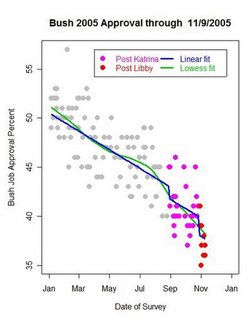
My God, there is a worm in your Apple!—A random computer thought. Those of us smug bastards who use Macs and turn down our noses at the masses who have had Windows foisted on them (usually by corporate IT people—it’s not your fault), just received notice of a new security update for our operating system, Mac OS-X, which brought to mind a little tremble. It is not clear we will be able to stay smug forever.
The security upgrade is one of about a half dozen this year, which means that Apple is not taking anything for granted. Good on them. That Macs are more stable and secure than Windows machines is a given. OS-X, particularly it’s new incarnation, Tiger, is widely recognized as the best operating system going, and there has yet to be a successful virus, worm or spyware program written for it. I don’t have anti-virus software on my computer. I don’t need it.
But that might change.
Two reasons account for the Mac’s security advantage, and both may not be permanent. One, and the most obvious, is that if you are going to write malicious software you would want to do the maximum amount of damage, so you pick on the operating system found on 95 % of the world’s computers, not the system with about 3%. You pick on Microsoft, which almost seems to be a willing target. Second, Windows is what you would expect from a monopoly source, fat and sloppy, and comes complete with backdoors and gaps that virus writers can find faster than Microsoft. OS-X has far fewer of them. OS-X is based on UNIX, which is a far more secure base than Windows, and Apple’s variant, completely rewritten when Apple abandoned its original operating system, is elegant, sleek and tight. It is much, much harder to write a virus that attacks Tiger. Spyware and viruses can slip into Windows through various openings; OS-X will not load one without your express permission. Just say no. Viruses that do get loaded, usually in mail, are simply ignored by Tiger and spyware just takes up space. You can spread a virus in your Mac mail, but it won’t affect your computer. And you can’t run Outlook Express on a Mac.
But this are good times for Apple. The so-called halo effect (people enthralled with their iPods and their visits to Apple’s retail stores are more likely to buy their computers) seems to be working, and Apple’s share of the market is growing, if ever so slowly. It may not remain such a small target forever. As it grows, it may become an irresistible challenge to hackers to see if they can break in. For years, a 12-year-old boy can attack Windows; it takes a man to bust into Tiger. Moreover, Microsoft has promised a grand upgrade of Windows next year, and if the folks at Redmond are as bright as everyone thinks they ought to be, it will be far more secure that what they are pushing now. That’s not a given. The new system, Vista, is not even out yet and already viruses that can get it are circulating. I am counting on them to screw up. And Apple is rumored to be working on yet another version for next year.
Meanwhile, whether you use Windows or Tiger, when you get notice of a security upgrade, only an idiot would ignore it.

























